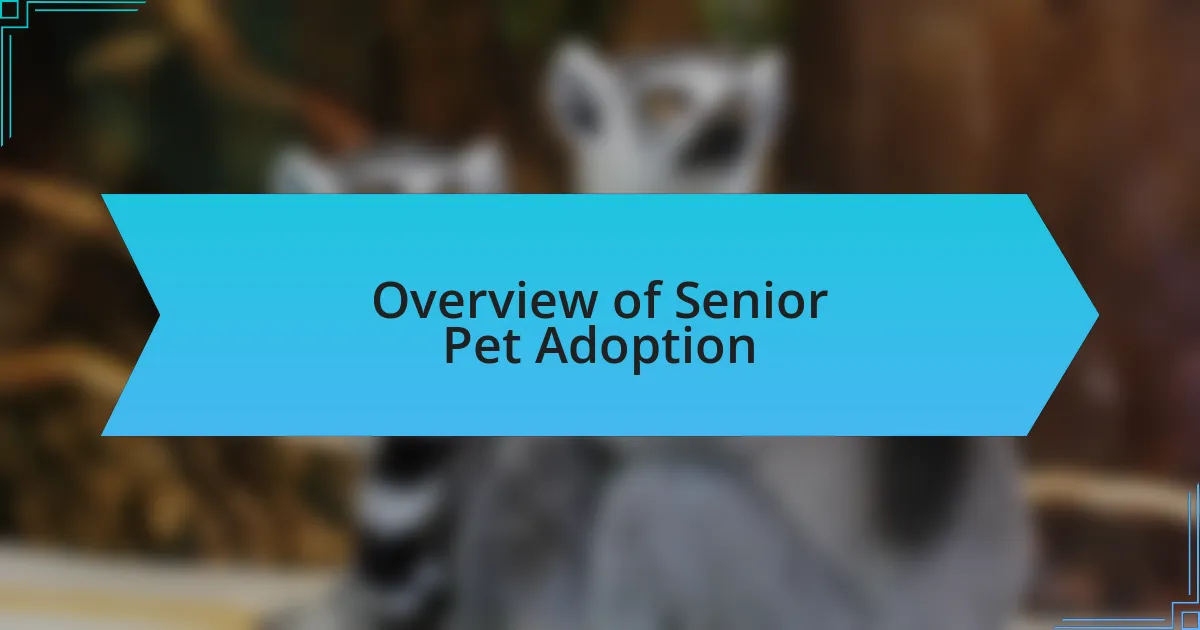Key takeaways:
- Senior pets are often overlooked in shelters, but adopting them can be a rewarding experience that enriches both their lives and yours.
- Companion animals like senior pets provide profound emotional support and comfort, often developing deep bonds with their owners.
- Caring for senior pets comes with challenges such as health management and financial responsibilities, but the investment is often worthwhile.
- Successful adoption requires preparation for lifestyle adjustments, understanding their specific needs, and practicing patience to build trust.

Overview of Senior Pet Adoption
When I think about senior pet adoption, I can’t help but feel a sense of compassion for those animals looking for a second chance. These pets often find themselves in shelters, overlooked simply because of their age. It’s heartbreaking to see them waiting, as if they understand the sadness of being forgotten.
Adopting a senior pet can be one of the most rewarding experiences. I remember when I brought home an elderly dog named Max; he instantly filled my home with love and warmth. His gentle demeanor and gratitude were palpable, making me realize that love knows no age. Isn’t it interesting how an older animal can teach you the true meaning of companionship?
Moreover, senior pets often come with unique advantages. They are typically calmer and more settled than their younger counterparts, which made my transition easier. Many have already been trained, saving new pet owners time and effort. Wouldn’t you agree that adopting a senior pet not only changes their world but also enriches your life in unexpected ways?

Importance of Adopting Senior Pets
When I think about the importance of adopting senior pets, I can’t help but appreciate the depth of their character. They come with so many stories and experiences, and I found that my cat, Luna, had a remarkable knack for reading my emotions. Watching her curl up beside me after a long day made me realize that companionship can come from the wisdom of age.
Senior pets often have a way of bonding that is both profound and healing. After adopting an older dog named Charlie, I discovered his gentle presence had a calming effect on my daily routine. It’s almost like they sense your needs and aim to be there for you in a way that’s deeply reassuring. Have you ever considered how an older pet can provide comfort and stability in your life?
Additionally, adopting senior pets encourages a compassionate choice that can transform their lives. When I took in Bella, a senior beagle, she blossomed in a warm, loving home. Her joy was infectious, reminding me that giving a home to a pet in need can be one of the simplest yet most powerful acts of kindness. Isn’t it amazing how such a small decision can lead to endless love and gratitude?

Benefits of Senior Pet Companionship
The companionship of senior pets brings a unique sense of comfort that’s hard to find elsewhere. I remember bringing home a golden retriever named Max, who, despite his age, had an uncanny ability to sense when I was feeling down. It was as if he knew just the right time to nuzzle up close, offering reassurance that everything would be okay.
There’s something about the slower pace of senior pets that allows for meaningful connections. When I adopted Lucy, an elderly tabby, her gentle purring combined with my quiet evenings created a nurturing environment. Have you ever noticed how peaceful moments with a senior pet can be? It’s like the world outside fades away, leaving just you and your furry friend in a comforting bubble.
Moreover, the joy they bring is often accompanied by a profound sense of gratitude. One day, after spending time with my senior cat, I realized how much I had learned from her patience and resilience. This bond goes beyond playfulness; it’s about mutual understanding. Isn’t it fascinating how opening your heart to a senior pet can lead to invaluable life lessons?

Challenges of Senior Pet Care
Caring for senior pets comes with unique challenges that can sometimes be overwhelming. I remember the first time I noticed that Max was slower to get up after lying down. It hit me hard; I had to adjust my expectations for our playtime, replacing energetic fetch games with gentle strolls around the yard. Have you ever had to modify activities because your pet is aging? It’s a tough pill to swallow but necessary for their comfort.
Another challenge is managing the various health issues that often accompany aging. Lucy required regular vet visits that included medications for her arthritis. I found myself becoming a bit of a caregiver, learning to administer pills and monitor her daily habits. This experience not only tested my patience but taught me the importance of being attentive to her needs. The uncertainty of her condition could be daunting at times. How do we navigate that emotional rollercoaster while ensuring they feel loved and secure?
Additionally, there’s the financial aspect of caring for an aging pet. Veterinary bills can accumulate quickly when dealing with chronic conditions, and I experienced this firsthand when Max needed special food and supplements. Facing financial stress on top of emotional concerns can feel overwhelming. Have you ever weighed the cost against the love you have for your pet? I’ve come to realize that the investment is worthwhile, as the human-animal bond is something that transcends monetary challenges.

Tips for a Successful Adoption
One of the key tips I’ve learned for a successful senior pet adoption is to be prepared for adjustments in lifestyle. When I adopted Bella, I knew she needed a calm environment, so I altered my home setup to create cozy resting spots away from noise. Have you thought about the changes you might need to make in your daily routine? These simple modifications can provide your new companion the security and comfort they need to thrive.
Understanding the specific needs of senior pets is crucial. For example, when I adopted Sparky, he required special bedding to help soothe his sore joints. I quickly discovered that investing in the right gear made a noticeable difference in his happiness. What adjustments have you made for the needs of senior pets? A little extra attention to their comfort can foster a strong bond and make a world of difference in their quality of life.
Lastly, patience is your best ally during the adoption process. I remember how it took weeks for Juno to warm up to me. At times, I felt disheartened, wondering if I had made the right decision. Yet, each small step we took together, whether through gentle encouragement or quiet moments, built trust and connection. Have you considered how patience could shape your relationship with a senior pet? It’s often the key to unlocking their true personality and forming a lasting friendship.